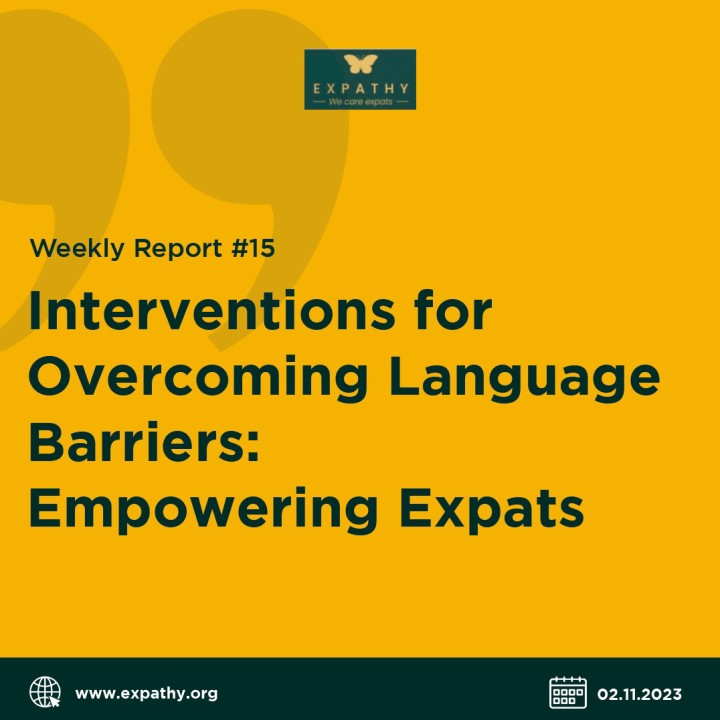Interventions for Overcoming Language Barriers: Empowering Expats
Language barriers can pose significant psychological challenges for expatriates, affecting various aspects of their lives, including emotional well-being and self-esteem. These barriers encompass not only the linguistic divide but also intricacies related to word choice and cultural influences on language. To support expatriates in navigating these complexities, therapists can employ a range of interventions that promote resilience, communication, and self-empowerment. This report explores diverse therapeutic solutions and instruments to help individuals overcome the psychological problems associated with experiencing language barriers.

Bridging Understanding
Cultural Psychoeducation
Cultural psychoeducation is a valuable tool for helping expatriates perceive language barriers in a more approachable way. It involves exploring the subtleties of language and the cultural elements that influence communication. By gaining a deeper understanding of the cultural context surrounding language, expatriates can approach these barriers with less negativity.
Situational Language Discussions
Collaborative discussions with a therapist can help expatriates identify specific topics or situations where language barriers frequently occur in their life. Through these discussions, expatriates can address unclear points, discuss core components of particular environments, and find ways to bridge the understanding gap, therefore building a more solid base for their future interactions. This intervention is not only effective for individuals but also for couples facing language barriers in their interactions.
Exploring Internal Worldviews
Therapists can work with expatriates to explore how they internalize and prioritize language barriers in their lives. Understanding the client’s perspective on the importance and impact of language barriers and assessing the adaptiveness of these factors is crucial to tailoring interventions effectively.
Managing Expectations: Tackling Unhelpful Beliefs
Unrealistic expectations about language proficiency can hinder progress. Psychoeducation about the language learning process, as well as cognitive-behavioural techniques can help tackle unhelpful beliefs and promote realistic learning goals. By identifying and challenging unhelpful beliefs about language proficiency or fear of judgment, expatriates can reframe their thinking patterns and reduce anxiety. For example, a therapist might work with a client to recognize that it’s normal to encounter language barriers when learning a new language, and it doesn’t reflect their overall competence or intelligence. This shift in thinking can significantly alleviate the distress associated with language barriers.
Prioritizing Communication: Emphasizing Effectiveness
Especially at first, it is important that expatriates are reminded to prioritize effective communication over linguistic perfection when learning a new language. This approach helps individuals convey their message without excessive concern about linguistic accuracy, therefore allowing them the freedom to make mistakes, which has proven to be beneficial for learning.
Emotional Responses and Self-esteem
Expressive Skills Development: Building Confidence
Teaching clients effective ways to express themselves when they encounter language barriers is essential. Roleplaying with a therapist and cognitive-behavioural techniques can help clients prepare for and navigate these situations, as well as manage feelings of shame or confusion, ultimately building their confidence in using a new language.
Managing Anxiety Responses: Overcoming “Freezing”
Expatriates often experience anxiety-related “freezing” when facing language barriers. Therapeutic interventions aimed at anxiety management, such as deep breathing, progressive muscle relaxation, or mindfulness meditation can help expatriates calm their nerves when language barriers trigger anxiety. These exercises enable individuals to maintain a level of relaxation that supports clearer thinking and communication, even when faced with challenging language situations.
Addressing Shame and Awkwardness: Normalizing the Experience
Normalization of feelings of shame and awkwardness related to language barriers is important. Therapists create a safe space for clients to openly discuss and learn about these challenges, emphasizing that these feelings are common and can be managed.
Enhancing Self-Esteem: Boosting Confidence
Low self-esteem can hinder individuals from feeling comfortable speaking a new language. Techniques such as positive affirmations can help clients challenge negative self-perceptions related to language proficiency. These affirmations are personalized statements that emphasize a person’s strengths and potential, encouraging a positive self-image. For example, a client struggling with a language barrier may practice affirmations like, “I am capable of learning a new language” or “I am resilient in the face of language challenges.”

Promoting Personal Involvement and Autonomy
In certain cases, clients may feel empowered when asked “What advice would you offer a friend in a similar position?”. This intervention increases personal involvement in one’s therapeutic process and fosters a sense of autonomy, contributing to one’s confidence.
Goal setting as a self-esteem tool
Another common therapeutic technique is setting achievable language-related goals. By breaking language learning into manageable milestones, clients can experience a sense of accomplishment with each success. These small victories gradually build self-esteem and boost their confidence in their language skills.
Separating Language Barriers from Other Factors: Minimizing Distress
Helping clients differentiate language barriers from other negative occurrences in their lives is essential. Language barriers are extremely common and can affect many factors in clients’ lives, for which reason they may seem to create many of the difficulties in the individual’s life. Therefore, by separating unrelated difficulties from the possible cause of language barrier, clients can minimize the distress they attribute to language barriers, allowing them to focus on solutions.
Alternative resources to draw upon
Motivation Enhancement: Recognizing Advantages
In cases where the language barrier seems to be exacerbated by low motivation, therapists can remind clients of the social and professional advantages of learning a new language. Long-term benefits, such as improved brain function and protection against neurodegenerative diseases, can serve as motivating factors.
Maintaining Support Networks: Fostering Connection
Encouraging clients to stay connected with their support networks in their native language is essential, when they are dealing with the lengthy and effortful process of learning a new language. This allows one to meet their own need for connection and reminds clients of their social value, providing renewed resources to tackle language barriers.
Engaging in Hobbies and Language Courses
Hobbies and language courses offer valuable opportunities to practice a new language in comfortable settings. As many hobbies do not depend on spoken language, they can help one find a comfortable context to practice their new language in, as well as broaden their social network and decrease feelings of loneliness, which may have exacerbated the language barriers in the first place.
Leveraging Priming for Language Use: A Strategic Approach
Educating clients about the influence of priming on language use can be transformative. Encourage clients to practice in the target language before important events, as that can allow them to refresh their language connections and knowledge, and minimize language barriers.
Conclusion
Empowering expatriates to overcome language barriers is a multifaceted process that involves psychoeducation, skill development, and emotional support. By addressing the psychological challenges associated with language barriers and employing tailored therapeutic interventions, expatriates can enhance their language abilities, reduce anxiety, and regain confidence in their communication skills. These interventions empower individuals to embrace the complexities of language barriers and navigate them with resilience and self-assuredness.